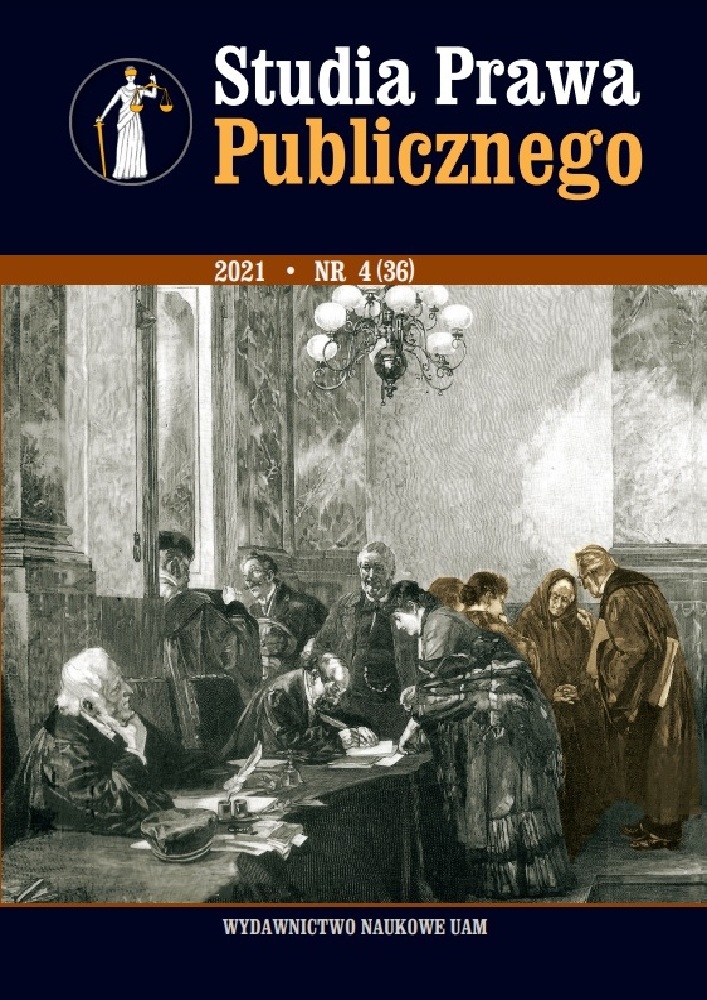Abstrakt
Undoubtedly, the end of 2019 will be recorded in the annals of modern human history as a time which resulted in an unprecedented event. This is because this year, the global epidemic of the SARS-CoV-2 virus broke out. This virus, on the other hand, leads to the development of an acute infectious disease of the respiratory tract, known as COVID-19. Therefore, the state of epidemic threat that was initially introduced in Poland, and then transformed into the current epidemic state, requires a particular reaction from the state authorities and also, it would seem, an appropriate response to the situation by the citizens themselves. In such exceptional circumstances, the obligation arises for the state to protect the life and health of its citizens, both in the area of enacting the relevant law and its implementation. However, there is a remedy for the growing number of new cases of COVID-19 and deaths in this context, namely the possibility of performing preventive vaccinations against this disease. This article aims to analyze and evaluate the legal regulations on preventive vaccinations against COVID-19 introduced in Poland. In this regard, reference is made to the basic assumptions used in the constitutional model of health care in
Poland. In this context, the principle of equal access to health care services financed from public funds and the constitutional exceptions to the principle of equal access to benefits, such as children, pregnant women, disabled and elderly people are discussed, as well as the principle of the active role of the state in combating epidemic threats. These considerations are complemented by an outline of the statutory and sub-statutory solutions in the health care model. The analysis also covers legal solutions adopted with regard to the COVID-19 epidemic, and presents the distribution of SARS-CoV-2 vaccines as well as restrictions, orders and bans in connection with the epidemic. In addition, the compliance of the distribution of SARS-CoV-2 vaccines with the constitutional model of health protection is assessed, with the criteria for assessing this distribution in the context of establishing the state of the epidemic being singled out.
Bibliografia
Bagińska E., Odpowiedzialność za brak dostępności do świadczeń zdrowotnych należnych w ramach systemu opieki zdrowotnej finansowanej ze środków publicznych. Odpowiedzialność podmiotów będących organizatorami systemu opieki zdrowotnej za brak dostępności świadczeń zdrowotnych, w: Odpowiedzialność prywatnoprawna. System Prawa Medycznego, t. 5, pod red. E. Bagińskiej, Warszawa 2021.
Bagińska E., Bączyk-Rozwadowska K., Drozdowska U., Karczewska-Kamińska N., Krupa-Lipińska K., Odpowiedzialność cywilna za szkody wyrządzone przy leczeniu (w związku z udzielaniem świadczeń zdrowotnych). Odpowiedzialność za szkody doznane w następstwie szczepień ochronnych, w: Odpowiedzialność prywatnoprawna. System Prawa Medycznego, t. 5, pod red. E. Bagińskiej, Warszawa 2021.
Banaszak B., Komentarz do art. 68, w: Konstytucja Rzeczypospolitej Polskiej. Komentarz, Warszawa 2012.
Banaszak B., Konstytucja Rzeczypospolitej Polskiej. Komentarz, Warszawa 2009.
Bosek L., Komentarz do art. 46a, w: Ustawa o zapobieganiu oraz zwalczaniu zakażeń i chorób zakaźnych u ludzi. Komentarz, pod red. L. Boska, Warszawa 2021.
Bosek L., Komentarz do art. 5, w: Ustawa o zapobieganiu oraz zwalczaniu zakażeń i chorób zakaźnych u ludzi. Komentarz, pod red. L. Boska, Warszawa 2021.
Bosek L., Komentarz do art. 68, w: Konstytucja RP. Tom I. Komentarz do art. 1–86, pod red. M. Safjana, L. Boska, Warszawa 2016.
Dercz M., Izdebski H., Organizacja ochrony zdrowia Rzeczypospolitej Polskiej w świetle obowiązującego ustawodawstwa, Warszawa–Poznań 2001.
Dercz M. (red.), Izdebski H., Rek T., Prawo publiczne ochrony zdrowia, Warszawa 2013.
Kaczocha M., Redagowanie aktów podustawowych. Zagadnienia praktyczne, Warszawa 2020.
Karczewska-Kamińska N., Przymus leczenia i inne interwencje medyczne bez zgody pacjenta, Warszawa 2018.
Kostyńska M., Koronawirus SARS-CoV-2 – słowniczek pojęć, które warto znać, https://www.medonet.pl/zdrowie,koronawirus-sars-cov-2---slowniczek-pojec-ktore-warto znac,artykul,70847711.html (dostęp: 28 X 2021).
Lach D.E., Zasada równego dostępu do świadczeń opieki zdrowotnej, Warszawa 2011.
Michalska-Badziak R., Ochrona zdrowia. Zagadnienia ogólne, w: Prawo administracyjne materialne, pod red. Z. Duniewskiej, B. Jaworskiej-Dębskiej, M. Stahl, Warszawa 2014.
Nosko J., Promocja zdrowia i ochrona zdrowia jako zadanie własne samorządu terytorialnego, cz. 1, „Zdrowie Publiczne” 2000, nr 4.
Nosko J., Promocja zdrowia i ochrona zdrowia jako zadanie własne samorządu terytorialnego, cz. 2, „Zdrowie Publiczne” 2000, nr 5.
Prokop K., Prawo do ochrony zdrowia w świetle art. 68 Konstytucji RP, w: Uwarunkowania prawne, ekonomiczne i socjologiczne funkcjonowania wybranych systemów ochrony zdrowia, pod red. T. Mróz, Białystok 2011.
Radajewski M., Prawa i wolności człowieka i obywatela w dobie pandemii, w: Pandemia Covid-19 a prawa i wolności obywatela, pod red. T. Gardockiej, D. Jagiełły, Warszawa 2020.
Wojtczak K., Kompetencje i zadania jednostek samorządu terytorialnego w zakresie bezpieczeństwa zdrowia ludności, „Studia Prawa Publicznego” 2018, nr 3(23).
Licencja
Prawa autorskie (c) 2021 Piotr Szudejko, Paulina Jachimowicz-Jankowska

Utwór dostępny jest na licencji Creative Commons Uznanie autorstwa – Użycie niekomercyjne – Bez utworów zależnych 4.0 Międzynarodowe.

